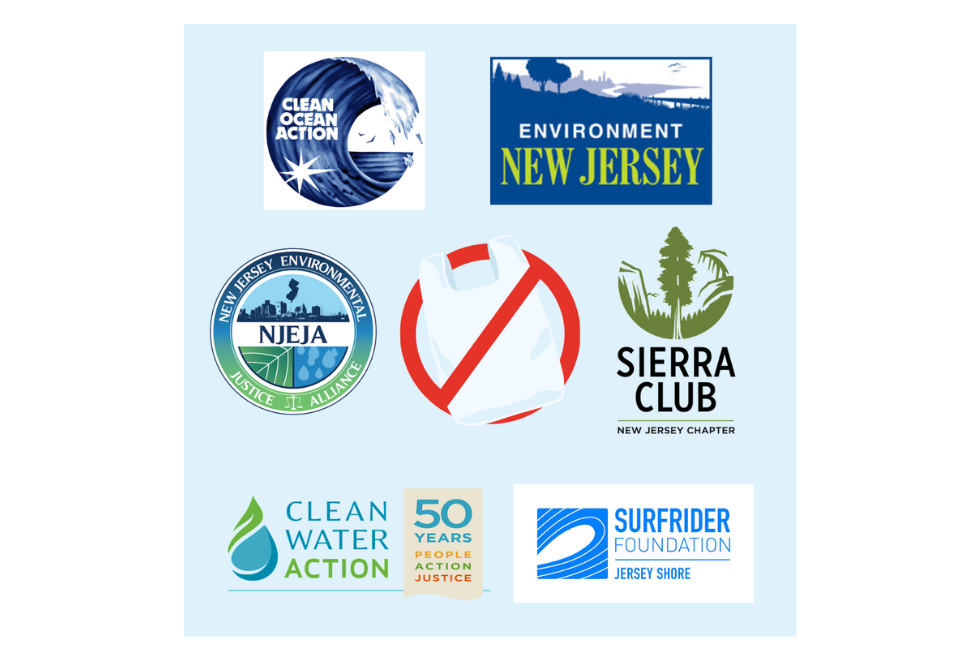
“Billions” of Single-Use Items Eliminated
New Jersey - Today, environmental groups reflected on the one-year anniversary of the full implementation of New Jersey’s “Get Past Plastic” law (P.L. 202, c.117). The groups lauded officials that sponsored, supported, and eventually passed and signed the law, but especially the public for shifting behaviors to adapt to the law. The law bans all plastic bags from stores, paper bags from large stores, foam plastic (e.g., Styrofoam) food containers, and limits plastic straws upon customer request.
In the first 5 months of the law coming into effect, the New Jersey Food Council estimated that 3.44 billion plastic bags and 68 million paper bags were eliminated from the waste stream. This spring, Clean Ocean Action’s 2022 Beach Sweeps Report, which provides information about items collected by thousands of volunteers from New Jersey beaches and along waterways, shows bags, foam items, and straws declined in 2022:
- Plastic Shopping Bags decreased 37% and were not in the top 12 most collected items (called the “Dirty Dozen” list) for the first time since 2007.
- Foam Plastic Takeout Containers decreased by 29% from Spring to Fall 2022; an overall decrease by 38% from 2021-2022.
- Plastic Straws/Stirrers fell to #6 on the Dirty Dozen list for the first time since 2016, decreasing 39% from 2021.
Groups Reflect:
“One year ago, New Jersey made a tremendous leap forward in the fight against plastic pollution by implementing the bag ban law, which prevented billions of single-use plastic bags from trashing our communities. Instead of bringing New Jersey to a halt, the law that banned bags and polystyrene foam (aka Styrofoam) has been a smashing success,” said Amy Goldsmith, NJ State Director for Clean Water Action. “In order to achieve more sustainable solutions and create a cleaner, healthier future for all New Jerseyans, regardless of their zip code or color of their skin, New Jersey must now pass a robust packaging reduction bill.”
“We are grateful to the New Jersey Legislature and Governor Murphy for making national history with the law’s passage and we are proud of all New Jerseyans and visitors for transitioning away from single-use plastic bags, foam, and straws, “ said Cindy Zipf, Executive Director of Clean Ocean Action. “We have made a huge dent in single use plastic use and abuse with the elimination of billions of bags, foam items, and straws. However, there is still more work to do, especially with implementing plastic straw limitations and compliance. This law, and New Jersey’s response, proves that we can live without single-use plastics.
"Beyond Plastics commends New Jersey leaders on this successful law that has led to sizable reductions in single-use plastic in just one year,” said Christina Dubin, community organizer with Beyond Plastics. “With production expected to triple by 2060, we know that plastics are the fossil fuel industry’s plan B and hope other states will follow New Jersey’s lead in taking action with strong policy to reduce plastic production and stop the disproportionate harm to people of color and low-income communities who are paying with their health.”
“This law has been an unqualified success in terms of bags and foamed plastic, and our oceans, waves , and beaches are cleaner for it,” said Don Greenberg, Legislative Coordinator for the Jersey Shore Chapter of Surfrider Foundation. “But the straw part of the law needs more enforcement because no drink served in NJ is supposed to have a straw unless the customer asks for it,” he added.
“Today marks a historic landmark for plastic reduction in New Jersey. Our comprehensive plastic reduction law has been able to tackle the menace of plastic pollution in New Jersey. In the past year, we’ve seen a major reduction in single use plastics. This is an incredible step towards protecting our environment and our public health,” said Anjuli Ramos-Busot, New Jersey Director of the Sierra Club. “Today we celebrate an important one-year anniversary for New Jersey’s plastic law, however we have a lot more work to do when it comes to enforcement, reductions in plastic straws, a strong EPR bill and more.
"A decade ago, there was skepticism that we could ever ditch single-use plastic bags. A year after the most comprehensive ban on single-use plastics went into effect, New Jersey is a shining example that single-use plastics can be eliminated. This reduction was immediate and it is estimated that we have avoided more than 8 billion single-use plastic bags since the law’s passage. We commend Gov. Murphy, the Legislature and prime sponsor Sen. Bob Smith for fully supporting a ban on single-use plastic bags – there has been an immediate benefit for our environment and communities. This is real environmental and cultural change – making the shift to reusable bags has been a landmark win for our environment,” said Doug O’Malley, Director of Environment New Jersey.
“Currently, far too much plastic waste ends-up being burned at incinerators in NJ’s Environmental Justice communities. This law has added a layer of policy support to reduce the amount of plastics going into these incinerators’ waste-stream. This directly reduces the amounts of toxic pollutants emitted from the burning of plastics – pollutants that have and continue to severely impact the health of people of color and low-income communities. As the crisis of waste and plastic pollution continues to knock on our communities’ front doors, we will continue to organize and advocate for strong policies to protect our communities and the environment,” said Chris Tandazo, Statewide EJ Organizer, New Jersey Environmental Justice Alliance.
The groups have set sail to support several key bills to help further reduce plastic waste, including an Extended Producer Responsibility (EPR) bill, a bottle bill, “Skip the Stuff,” among others.
For more on the law, go to dep.nj.gov/get-past-plastic.
###
Since our founding during the campaign to pass the landmark Clean Water Act in 1972, Clean Water Action has worked to win strong health and environmental protections by bringing issue expertise, solution-oriented thinking, and people power to the table. www.cleanwater.org